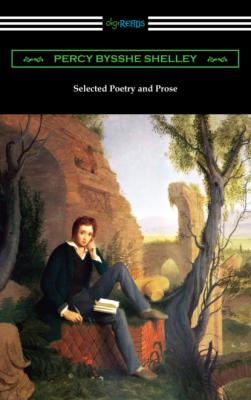Selected Poetry and Prose. Percy Bysshe Shelley
Чтение книги онлайн.
Читать онлайн книгу Selected Poetry and Prose - Percy Bysshe Shelley страница 68
 purple crags and silver towers
purple crags and silver towers
Of battlemented cloud, as in derision
Of kingliest masonry: the ocean-floors
Pave it; the evening sky pavilions it;
Its portals are inhabited
By thunder-zoned winds, each head
Within its cloudy wings with sun-fire garlanded,—
A divine work! Athens, diviner yet,
Gleamed with its crest of columns, on the will
Of man, as on a mount of diamond, set;
For thou wert, and thine all-creative skill
Peopled, with forms that mock the eternal dead
In marble immortality, that hill
Which was thine earliest throne and latest oracle.
VI.
Within the surface of Time’s fleeting river
Its wrinkled image lies, as then it lay
Immovably unquiet, and for ever
It trembles, but it cannot pass away!
The voices of thy bards and sages thunder
With an earth-awakening blast
Through the caverns of the past:
Religion veils her eyes; Oppression shrinks aghast:
A winged sound of joy, and love, and wonder,
Which soars where Expectation never flew,
Rending the veil of space and time asunder!
One ocean feeds the clouds, and streams, and dew;
One Sun illumines Heaven; one Spirit vast
With life and love makes chaos ever new,
As Athens doth the world with thy delight renew.
VII.
Then Rome was, and from thy deep bosom fairest,
Like a wolf-cub from a Cadmaean Maenad,
She drew the milk of greatness, though thy dearest
From that Elysian food was yet unweaned;
And many a deed of terrible uprightness
By thy sweet love was sanctified;
And in thy smile, and by thy side,
Saintly Camillus lived, and firm Atilius died.
But when tears stained thy robe of vestal-whiteness,
And gold profaned thy Capitolian throne,
Thou didst desert, with spirit-winged lightness,
The senate of the tyrants: they sunk prone
Slaves of one tyrant: Palatinus sighed
Faint echoes of Ionian song; that tone
Thou didst delay to hear, lamenting to disown
VIII.
From what Hyrcanian glen or frozen hill,
Or piny promontory of the Arctic main,
Or utmost islet inaccessible,
Didst thou lament the ruin of thy reign,
Teaching the woods and waves, and desert rocks,
And every Naiad’s ice-cold urn,
To talk in echoes sad and stern
Of that sublimest lore which man had dared unlearn?
For neither didst thou watch the wizard flocks
Of the Scald’s dreams, nor haunt the Druid’s sleep.
What if the tears rained through thy shattered locks
Were quickly dried? for thou didst groan, not weep,
When from its sea of death, to kill and burn,
The Galilean serpent forth did creep,
And made thy world an undistinguishable heap.
IX.
A thousand years the Earth cried, ‘Where art thou?’
And then the shadow of thy coming fell
On Saxon Alfred’s olive-cinctured brow:
And many a warrior-peopled citadel.
Like rocks which fire lifts out of the flat deep,
Arose in sacred Italy,
Frowning o’er the tempestuous sea
Of kings, and priests, and slaves, in tower-crowned majesty;
That multitudinous anarchy did sweep
And burst around their walls, like idle foam,
Whilst from the human spirit’s deepest deep
Strange melody with love and awe struck dumb
Dissonant arms; and Art, which cannot die,
With divine wand traced on our earthly home
Fit imagery to pave Heaven’s everlasting dome.
X.
Thou huntress swifter than the Moon! thou terror
Of the world’s wolves! thou bearer of the quiver,
Whose sunlike shafts pierce tempest-winged Error,
As light may pierce the clouds when they dissever
In the calm regions of the orient day!
Luther caught thy wakening glance;
Like lightning, from his leaden lance
Reflected, it dissolved the visions of the trance
In which, as in a tomb, the nations lay;
And England’s prophets hailed thee as their queen,
In